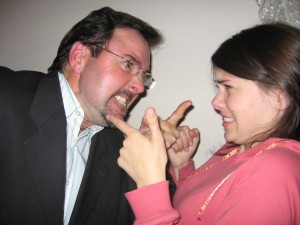Episode 103 – Helpful Confrontation: We All Need Tough Talk Sometimes
Podcast: Play in new window | Download ()
Subscribe: Apple Podcasts | Spotify | RSS | More
Download The Podcast Or Non-Flash Playback

For a few weeks I’ve been thinking about the subject of helping, coaching, consulting, mentoring and advising. Many people hammer those of us in the “helping” businesses because they think we’re frauds and fakes. Some are, but that’s true of most professions.
I’ve postponed talking about it, but this morning serendipity kicked me in the butt and compelled me to record today’s episode. The serendipity arrived in the form of another podcast.
EndingTheGrind.com is a site and podcast done by Steve. He interviewed Penelope Trunk for his show and not too many minutes into the show, things took a turn that Steve wasn’t expecting. He got some career advice from Ms. Trunk that I relished hearing, even though others felt uncomfortable with the conversation.
It was profitable confrontation. I saw it for what I think it was – honest, blunt help!
My first thought was, “Steve’s lucky. She’s taking the time to really give him a dose of medicine that may change his life.”
Steve posts that he had reached out to Marcus Sheridan, TheSalesLion.com, for advice about the interview. After hearing the interview, I agreed with Marcus.
From the comments and Tweets it appears others may have felt Penelope was rude, hateful and angry. I didn’t see it or hear it that way, but I certainly could relate to the clear frustration she experienced. She saw things quite clearly. Steve didn’t. It made her crazy. I know that feeling.
We all need help. There are times in our lives when we all need a kick in the butt.
It’s ridiculous to claim that only people who have no challenges are capable of helping others. The doctor who gets sick needs the care (help) of another doctor. The barber has to get his hair cut (unless he shaves his head like all the cool kids do). The dentist must go to the dentist.
Helping people is an honorable thing to do, whether people get paid to do it or not. Penelope didn’t give Steve advice because he paid for it, even though he joked about her sending him a bill. No, she had an opportunity to pass on some wisdom, as she saw it, and she took it. Steve didn’t see it at the time, but I suspect he’s coming around by now.
It was great to hear, even if my audio snobbery lamented the audio quality of the podcast. It was compelling. It was powerful. All the while I was thinking, “Steve, this can change your life if you let it.” I hope he uses it to climb higher. And I don’t even know Steve, but I know enough to suspect he’ll embrace it. I hope so.
I hope you’ve got people in your life who are willing to confront you in order to help you. I do. And I’m thankful for all of them.

Episode 103 – Helpful Confrontation: We All Need Tough Talk Sometimes Read More »




